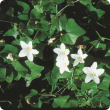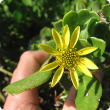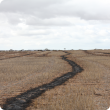Weeds
Weeds pose a serious risk for primary producers as they can impact on market access and agricultural production.
In 2006/07, each Western Australian agricultural business spent an average of $29 376 ($341 million total) on weed control (Australian Bureau of Statistics).
Weed control is a shared responsibility between landholders, grower groups, biosecurity groups and the Department of Primary Industries and Regional Development.
To protect WA’s agriculture, the department:
- works with landholders, grower groups, community groups and biosecurity groups
- regulates weeds under the Biosecurity and Agriculture Management Act 2007
- provides a weed identification service
- provides a predictive simulation tool called weed seed wizard
- provides information on weed control, crop weeds, regulated/declared plants and herbicides
- contributes to social science through weedwatcher.
For advice on weeds search our website, the Western Australian Organism List or contact our Pest and Disease Information Service (PaDIS).
For diagnostic services, please contact our Diagnostic Laboratory Services.
Filter by search
Filter by topic
- (-) Remove Control methods filter Control methods
- Chemicals (67) Apply Chemicals filter
- Herbicides (65) Apply Herbicides filter
- Declared plants (45) Apply Declared plants filter
- Crop weeds (24) Apply Crop weeds filter
- Crops (22) Apply Crops filter
- Grains (18) Apply Grains filter
- Weeds of National Significance (17) Apply Weeds of National Significance filter
- Mechanical, physical and cultural (13) Apply Mechanical, physical and cultural filter
- Grains research & development (11) Apply Grains research & development filter
- Biological control (4) Apply Biological control filter
- Pastures (4) Apply Pastures filter
- Pests (3) Apply Pests filter
- Wheat (3) Apply Wheat filter
- Diseases (3) Apply Diseases filter
- Livestock & animals (2) Apply Livestock & animals filter
- Livestock management (2) Apply Livestock management filter
- Pasture management (2) Apply Pasture management filter
- Pest insects (2) Apply Pest insects filter
- Lupins (2) Apply Lupins filter
- Invasive species (2) Apply Invasive species filter
- Feeding & nutrition (2) Apply Feeding & nutrition filter
- Biosecurity & quarantine (2) Apply Biosecurity & quarantine filter
- Biosecurity (2) Apply Biosecurity filter
- Crop diseases (2) Apply Crop diseases filter
- Plant biosecurity (1) Apply Plant biosecurity filter
- Oats (1) Apply Oats filter
- Production & postharvest (1) Apply Production & postharvest filter
- Quarantine (1) Apply Quarantine filter
- Viruses & virus-like (1) Apply Viruses & virus-like filter
- Nematodes (1) Apply Nematodes filter
- Pulses (1) Apply Pulses filter
- Harvesting (1) Apply Harvesting filter
- Fungi (1) Apply Fungi filter
- Emergency response (1) Apply Emergency response filter
- Fungicides (1) Apply Fungicides filter
- Grains Research & Development (1) Apply Grains Research & Development filter
- Intrastate movement (1) Apply Intrastate movement filter
- Livestock biosecurity (1) Apply Livestock biosecurity filter












